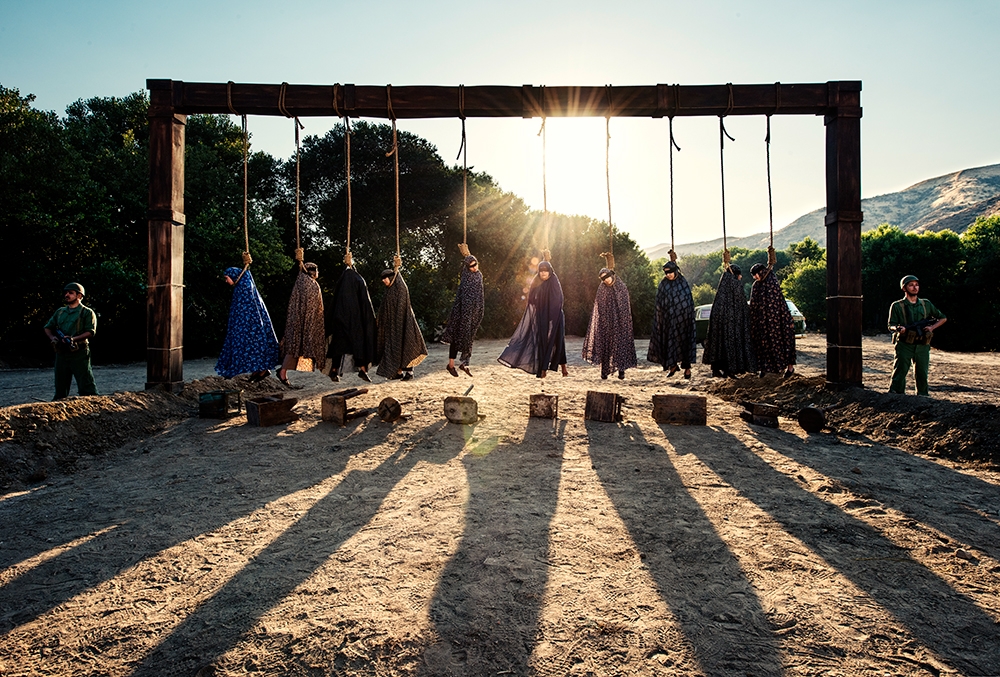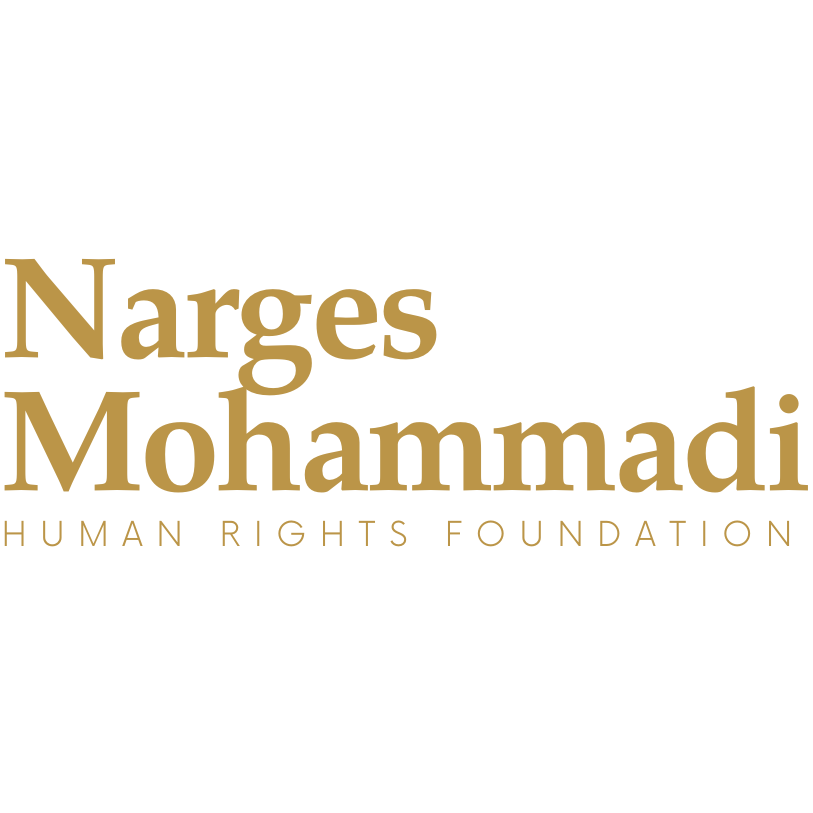
Nobel Laureate Narges Mohammadi Sends Voice Message to Mark the First Anniversary of “No to Execution Tuesdays” Campaign
Nobel Laureate Narges Mohammadi Sends Voice Message to Mark the First Anniversary of “No to Execution Tuesdays” Campaign
January 28, 2025 – On the first anniversary of the “No to Execution Tuesdays” campaign, Narges Mohammadi, Nobel Peace Prize laureate and prominent human rights defender, sent a voice message to an exclusive Clubhouse discussion dedicated to the campaign.
Currently out of prison on a 21-day temporary sentence suspension, Mohammadi used this rare opportunity to express her deep gratitude to the prisoners and activists who have kept the movement alive over the past year.
In her message, she honored the prisoners who initiated and sustained the campaign from behind bars, the individuals who later joined, the media that amplified their voices, and the human rights organizations that supported this movement.
Full Voice Message from Narges Mohammadi:
The “No to Execution Tuesdays” campaign, which began a year ago in Iran, has grown into a powerful civil movement, with dozens of prisons participating and hundreds of prisoners going on hunger strike every Tuesday to protest executions. The movement continues to gain momentum, drawing international attention to the alarming rise in executions in Iran.
Mohammadi’s message underscores the moral, human rights, and political necessity of opposing the death penalty, urging solidarity among activists, media, and the global community to support this life-saving cause.
Full Text Message from Narges Mohammadi :
[00:00.1]
Hello. I thank the esteemed audience and the organizers of this event. I urge everyone not to lose hope. I also extend my gratitude to the prisoners who supported the “No to Execution Tuesdays” campaign from inside prisons, those who joined later, the media that amplified their voices, and the human rights organizations that stood by this campaign.
[00:37.3]
“No to Execution Tuesdays” is a civil movement—and civil movements can grow. This movement has expanded across Iranian society. Today, dozens of prisons have joined, and hundreds of prisoners go on hunger strikes every Tuesday to keep the issue of executions in the spotlight. Political and ideological prisoners from diverse backgrounds are actively participating in this campaign.
[01:14.9]
The voices of these prisoners are being heard worldwide, strengthening the campaign. This is a human rights movement—paving the way for democracy, freedom, and justice.
[01:40.2]
The next issue I want to address is the regime’s use of widespread executions to instill fear, silence dissent, and consolidate its power. However, strong protests—especially the “No to Execution” campaign—can challenge these authoritarian goals and even prevent them. This movement is both comprehensive and inclusive.
[02:18.1]
It is not limited to political and ideological prisoners but calls for an end to all executions. We oppose every execution carried out in Iranian prisons. Though the details are extensive, I will not address them in this meeting.
[02:41.6]
Many death row inmates are victims of unjust economic, social, and cultural policies. We oppose their executions in principle, and this stance can help build a broader consensus both in society and within prisons.
[03:03.1]
Another crucial point is that opposing the death penalty can unite democratic and human rights movements. From this perspective, this campaign is strategic—it forges alliances among those who believe in democracy and human rights, helping them take the next steps together.
[03:30.5]
In today’s Iran, fighting against the death penalty is a moral, human rights, and political necessity. I hope that as this movement grows—through the protests of “No to Execution Tuesdays” and with support from the media, human rights organizations, and the international community—we will witness the dismantling of the gallows.
[04:13.7]
Finally, we must remember: the ropes of the gallows will be torn by the powerful hands of each and every one of us. I hope for the day when execution chambers and gallows serve only as reminders of tyranny’s cruelty and as lessons for our pursuit of humanity, freedom, and equality.
[04:50.9]
Until that day, I thank you all.
نرگس محمدی: جمهوری اسلامی با اعدامهای گسترده میخواهد اقتدار پوشالیاش را به رخ بکشد
نرگس محمدی، شب گذشته در نشستی به مناسبت اولین سالگرد «کارزار سهشنبههای نه به اعدام» گفت جمهوری اسلامی از طریق این مجازات به دنبال ایجاد وحشت در جامعه است. محمدی کارزار نه به اعدام را حرکتی مدنی دانست که در کشور قابل گسترش است.
محمدی سهشنبه ۹ بهمن ۱۴۰۳ در نشست سالگرد «کارزار سهشنبههای نه به اعدام» در اتاق «به یاد آر» در شبکه اجتماعی «کلابهاوس» گفت: «جمهوری اسلامی از طریق اعدامهای گسترده به دنبال ایجاد وحشت در جامعه است تا صدای معترضان را خفه کند و اقتدار پوشالی خود را به رخ جامعه بکشد.»
او گفت کارزار نه به اعدام، یک فعالیت حقوق بشری است و تحقق حقوق بشر راه را برای رسیدن به دموکراسی، آزادی و عدالت هموار میکند.
محمدی با تاکید بر این که «مبارزه با اعدام یک امر اخلاقی، حقوق بشری و سیاسی» است، گفت: «امیدوارم با قدرتمند شدن فعالیتها برای لغو حکم اعدام شاهد برچیده شدن طنابهای دار در ایران باشیم.»
او گفت: «طنابهای دار با دستان قدرتمند تک تک ما پاره خواهد شد و امیدوارم روزی را شاهد باشیم که اتاقهای اعدام و چوبههای دار مکانی برای درس گرفتن انسانها از پیامدهای شر استبداد و درسی برای حرکتهای رو به جلو برای رسیدن به انسانیت، آزادی و برابری باشد.»
محمدی کارزار «سهشنبههای نه به اعدام» را یک «حرکت مدنی» دانست که در کشور قابل گسترش است.
او شرکت زندانیان سیاسی ایران از گرایشها و نحلههای مختلف در این کارزار را در شنیده شدن صدای آن در نقاط مختلف جهان موثر دانست.
محمدی گفت: «کارزار نه به اعدام، یک فعالیت حقوق بشری است و تحقق حقوق بشر راه را برای رسیدن به دموکراسی، آزادی و عدالت هموار میکند.»
این زندانی سیاسی تاکید کرد: «کارزار مخالفت با اعدام میتواند در شکلگیری وحدت میان گروههای حامی دموکراسی و حقوق بشر ایران نقشی راهبردی داشته باشد و مخالفان جمهوری اسلامی را متحد کند.»
هفته گذشته، نرگس محمدی در سخنرانی خود در یک نشست با مجلس سنای فرانسه و نمایندگان پارلمان فرانسه که به صورت ویدیوکنفرانس برگزار شد، به افزایش نگرانکننده اعدامها و وضعیت «اسفناک» زنان زندانی سیاسی در ایران اشاره کرد.
او گفت: «آنها تلاش دارند انتقام جنبش زن، زندگی، آزادی را از زنان بگیرند. طناب دار پخشان عزیزی و وریشه مرادی را که در بند زنان زندان اوین محبوس هستند بر بالای سر زنان تاب میدهند تا زنان شجاع و آگاه ایران را وادار به عقبنشینی کنند.»
کارزار «سهشنبههای نه به اعدام» که با هدف اعتراض به اعدامهای گسترده در ایران شکل گرفته، اکنون به پنجاه و سومین هفته خود رسیده است.
زندانیان در این کارزار سهشنبه هر هفته دست به اعتصاب غذا میزنند تا صدای خود را در دفاع از حقوق بشر و ضرورت برچیدن اعدامها، به گوش مردم ایران و نهادهای بینالمللی برسانند.
لینک کامل ویدیو پیام نرگس محمدی :


